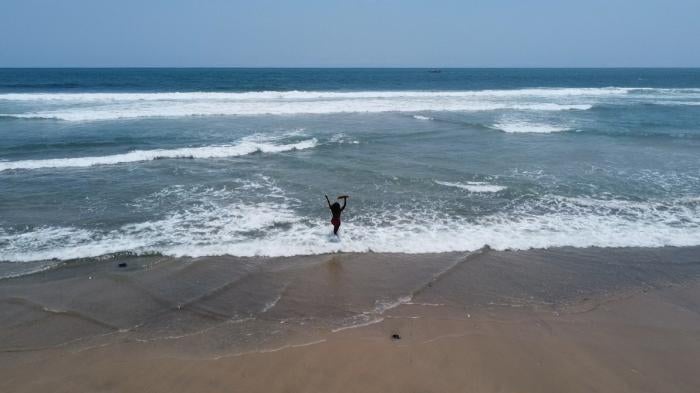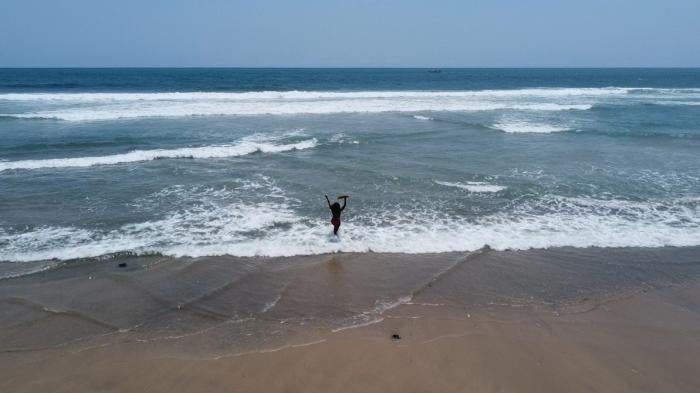Ghana: Invest More in Mental Health Services
Read a text description of this video
SOUNDBITE: Abena
Freedom means waking up to do what I love without any restrictions, getting the necessary support, and also just feeling very liberated.
VO:
Human Rights Watch has been speaking with people who are locked up simply because they have a mental health condition, to see how their lives have changed since returning home to their communities.
SOUNDBITE: Abena
I love art, I love yoga, I love hiking. You know, I love Africa.
SOUNDBITE: Mimi (a pseudonym)
It is good to be, to be back to the community. My family has been very supportive. Their support is very important, like if you get a supportive family and a supportive community where people don’t stigmatize you or people don't criticize you.
VO:
In Ghana, like in many countries, people with psychosocial disabilities or mental health conditions face stigma on a daily basis. This stigma means people with psychosocial disabilities, are often locked away in “prayer camps” and traditional healing centers where they maybe subjected to shackling and other human rights abuses.
SOUNDBITE: Mimi (a pseudonym)
From what I remember, I was not happy to be there. Being locked up in your room. I don’t remember being shackled but I said I remember when they were taking it [the shackles] off. When they took it off, I would go back into the room and they would lock the door. I would be there in the room alone during the night. I really didn’t like that experience, being alone locked up.
VO:
People with psychosocial disabilities should not be locked up or shackled. Instead, the government should support them to live in the community. Since 2011, Human Rights Watch has been documenting what life is like for people with psychosocial disabilities when locked away, often in chains.
SOUNDBITE: Bernard
I was there for two years [prayer camp.] And during those times to my children were not old at all. So I think of them a lot. So I sometimes cry, bitterly with loud voice, calling them, but this was my situation.
SOUNDBITE: Abena
I have not been shackled, but I've been physically restrained. You know, about four, five strong men holding me down, for me to receive injections that were not necessary.
VO:
Human Rights Watch found that families often take people with real or perceived psychosocial disabilities to faith-based or traditional healers because of the widely held beliefs that such disabilities are caused by curses or evil spirits, and because their communities have limited, if any, mental health services.
SOUNDBITE: Abena
The quality of care has to be improved.
SOUNDBITE: Mimi (a pseudonym)
In our country there’s so many misconceptions about mental health.
SOUNDBITE: Mimi (a pseudonym)
I think education is very important.
SOUNDBITE: Abena
Yeah, I have been ostracized a lot. You know, there were times where I lost employment opportunities. And it affected, like, almost all aspects of my life.
VO:
The Ghanaian government should provide rights-respecting mental health services at the community level and ensure that people with psychosocial disabilities get adequate support for housing, independent living, and job training.
SOUNDBITE: Bernard
Good community means community which is decent. You do things on your own. You can socialize at any place that you want to. And you can attend church. That's what I know is a good community. You have your freedom, you have your peace, you can move about freely.
SOUNDBITE: Mimi (a pseudonym)
I am really happy when I am able to achieve something and I get good results from it. Something I enjoy doing like maybe swimming or cooking something that releases stress or helps me to relax. I also love to see family and friends too, they make me happy.
SOUNDBITE: Mimi (a pseudonym)
In the future I am hoping that the awareness will be created and the stigma will be reduced and people will be much more enlightened about mental health issues and how to offer support especially when the person is going through a crisis.
SOUNDBITE: Abena
People close to me, they are very very supportive, because they understand and they have seen my growth.
SOUNDBITE: Abena
Being independent is a must. It is something that we all have to demand and have. So you can actually, you know, be yourself, live your best life. You know, to the fullest.
END CREDITS

